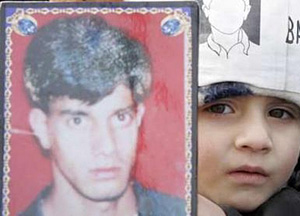 |
 |
 |
 News from Around the Americas | February 2007 News from Around the Americas | February 2007  
US Doesn't Sign Ban on Disappearances
 ANCOSO Development GmbH ANCOSO Development GmbH


| | A boy sits behind a picture of Bashir Ahmad, a missing Kashmiri youth, during a protest against the disappearances of Kashmiri youths who the protesters say were civilians picked up by the Indian security force since a rebellion broke out in the Himalayan region at the end of 1989, in Srinagar February 5, 2007. (Reuters/Danish Ismail) |
Nearly 60 countries signed a treaty on Tuesday that bans governments from holding people in secret detention, but the United States and some of its key European allies were not among them.

The signing capped a quarter-century of efforts by families of people who have vanished at the hands of governments.

"Our American friends were naturally invited to this ceremony; unfortunately, they weren't able to join us," French Foreign Minister Philippe Douste-Blazy told reporters after 57 nations signed the treaty at his ministry in Paris.

"That won't prevent them from one day signing on in New York at U.N. headquarters - and I hope they will."

The U.S. Embassy in Paris declined immediate comment. President Bush acknowledged in September that terrorism suspects have been held in CIA-run prisons overseas, but did not specify where.

Many other Western nations, including Germany, Spain, Britain and Italy, also did not sign the treaty. France introduced the convention at the U.N. General Assembly in November and it was adopted in December.

Many delegates expressed hope that other nations will sign by year-end. Some European nations have expressed support for the treaty, but face constitutional hurdles or require a full Cabinet debate before signing, French and U.N. officials said.

U.N. High Commissioner for Human Rights Louise Arbour called the treaty an important step both in preventing injustices common years ago and barring newer abuses that often fall through regulatory loopholes.

Arbour said the United States had expressed "reservations" about parts of the text, but declined to elaborate, and she urged U.S. officials to sign and ratify it. She noted that America often backs activities of the UNHCR without formally signing on to them.

She called the treaty "a message to all modern-day authorities committed to the fight against terrorism" that some past tactics are now "not acceptable, in a very explicit way."

The convention defines forced disappearances as the arrest, detention, kidnapping or "any other form of deprivation of freedom" by state agents or affiliates, followed by denials or cover-ups about the detention and location of the person gone missing.

Nations that eventually ratify the text would enshrine victims' rights, and would require states to penalize any forced disappearances in their countries and enact preventative and monitoring measures.

French officials, who led the effort, counted more than 51,000 people who were disappeared by their governments in over 90 countries since 1980, Douste-Blazy said. Some 41,000 of those cases remain unsolved.

"Men and women disappear every day on every continent, for defending human rights, for just opposing their governments' policies or simply because they want justice," Douste-Blazy said. "The situation could not continue to go unpunished. It required a strong response from the international community."

Latin American states like Argentina, once plagued by disappearances, are now owning up to much of the violence that left hundreds of thousands dead or disappeared in the 1970s and 1980s. Disappearances were also a common Nazi tactic in World War II.

Argentina's first lady, lawmaker Cristina Kirchner, took part in the signing. She was in Paris in an effort to raise her profile before a potential presidential bid. | 
 | |
 |



